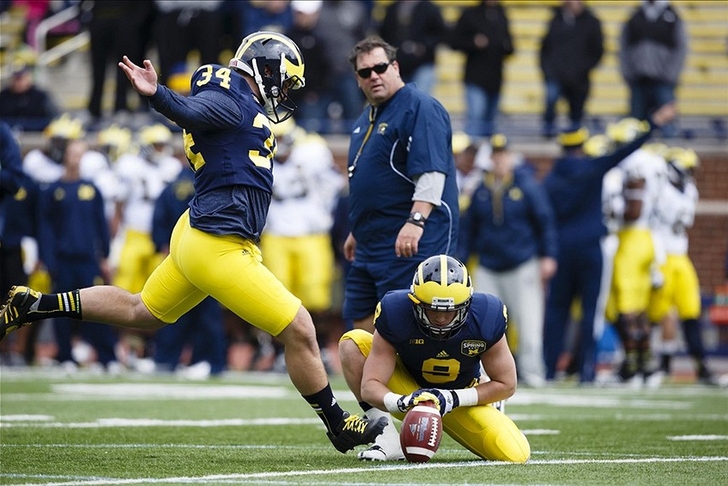The following was written by an individual who wishes to remain anonymous due to involvement with the UM Athletic Department.
On January 28, The Michigan Daily reported that Michigan expelled kicker Brendan Gibbons from the university for a sexual assault incident that occurred in November of 2009. A week has passed as the community digests the news, but what does this episode imply about the state of college sports?
Normally, a sexual misconduct charge wouldn’t bring such a hurricane of disapproval down on the university itself, but Gibbons’ case is unique in that after the charge, he played his entire college career and received notification of being “permanently separated” just shortly after his senior season ended.
Gibbons, despite struggles early in his career, was one of the best kickers in school history from 2011-2013. He kicked a game-winning field goal in overtime to give the Wolverines a Sugar Bowl Championship in January of 2012, and sealed wins over Michigan State and Northwestern at home the following year with clutch kicks in Ann Arbor.
In his final season, Gibbons pulled off an incredible field goal against Northwestern with one second remaining in regulation to send the game into overtime. Michigan eventually won the game.
Overall, Gibbons was a fantastic player in a Michigan uniform - but can the same be said about him as a student?
Throughout his career, rumblings about the sexual assault allegations lingered in Gibbons’ wake. Nothing concrete surfaced from the university or the victim, but the whispers mixed with the young man’s strange sense of humor to generate suspicion.
Finally, when information leaked that Gibbons had been removed from school, the whispers turned into an uproar. Fans that care about more than Michigan's performance on the football field demanded an explanation as to why this suddenly-guilty kicker lasted so long at the university.
Before Michigan’s biggest game of the season against hated rival Ohio State, Head Coach Brady Hoke revealed that Gibbons could miss the game because of a muscle injury. Weeks later, Gibbons stayed home while the rest of the team flew to Tempe, Arizona for the Buffalo Wild Wings Bowl. Hoke said Gibbons was dealing with family issues.
Gibbons’ absence in two of the biggest games of the season, combined with the expulsion letter that the Michigan Daily reports reached his home on December 19, create an unpleasant possibility: did the athlete’s success on the football field result in temporary leniency for a heinous crime?
If the school deemed its information adequate to permanently remove Gibbons in 2013, what was missing in 2009 that allowed him to stay? The timing of the expulsion couldn’t be sketchier, as the deciscion came just a month after Gibbons’ football eligibility expired.
Brady Hoke remains noticeably quiet on the matter, but as football coach, he likely isn’t deeply involved in the issue. The decision to retain or expel Gibbons came from higher up in the university, and that authority appeared to hesitate when he or she needed to take action.
The University of Michigan undoubtedly boasts one of the top college football programs in the country, but it’s the golden reputation outside of athletics that sets it apart. Instances like this one shed a negative light on the school as a whole, an issue much more important than performance on the football field.
It’s still unclear whether or not the university actually did something wrong - Gibbons likely fought tooth-and-nail to remain eligible for his entire Michigan football career. However, signs point to officials failing to conduct an exhaustive investigation into the matter until the consequences were diminished.
Another possibility remains: the information needed to expel Gibbons may have been withheld from the university until his football career ended. The Michigan Daily revealed that the documents behind its report were not obtained from the university, which suggests involvement from a third party.
What’s really been brought to light is a much bigger problem: what is society willing to do for its love of sports?
No matter who is at fault for sheltering Gibbons after allegations were made, it appears it was done to extend his football career. Gibbons deserves the same punishment for his crimes that any other individual would receive; protecting him sends the wrong message to future athletes within the system.
Sports, football chief among them, are a crucial part of the college landscape. Success on the football field leads not only generates revenue for improvements and expansions, but also leads to increased interest in a university.
In their study on the impact of athletic success on interest in universities, Devin G. Pope and Jaren C. Pope found that success on the field at a top 20 football school results in an up to eight percent increase in applications. The study also showed that the quality of applications greatly increases after successful football seasons.
For example, in 2012, after the football team’s Sugar Bowl victory in January, the University of Michigan received around 42,000 freshman applications by February, a school record. That number represented about a 10 percent increase from the previous year’s record-setting number of over 39,500 applications.
Clearly, football is important to universities for much more than athletic revenue. But where will they draw the line?
When a highly-regarded school like the University of Michigan overlooks an incident for a place kicker, it raises haunting possibilities. What else is college football hiding?
Incidents like the Brendan Gibbons situation shine a glaring light on a serious issue that needs addressing, as the integrity of major universities and the future of the country’s favorite sport hang in the balance.
Back to the Michigan Wolverines Newsfeed